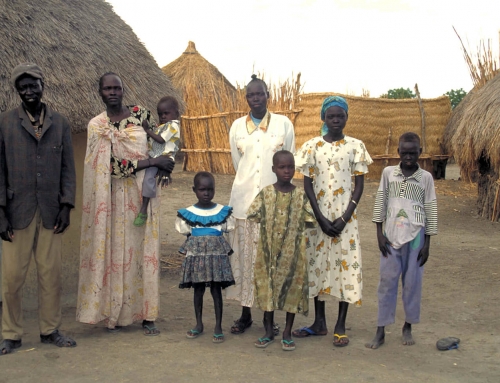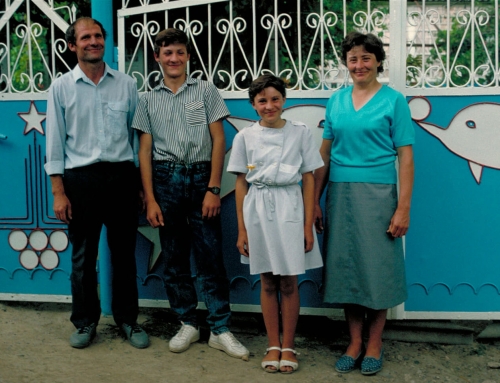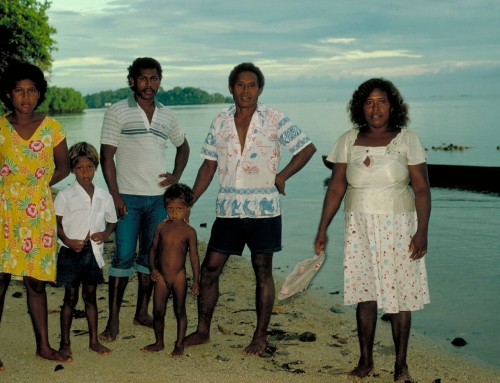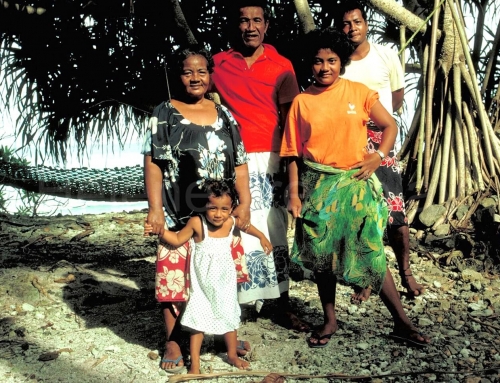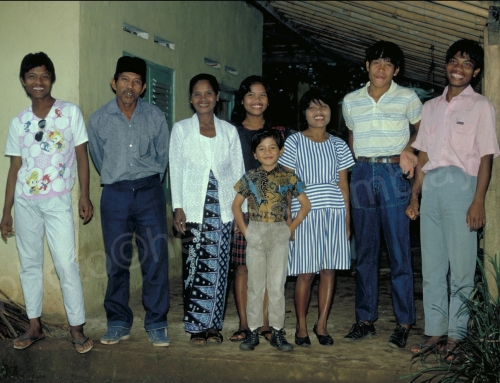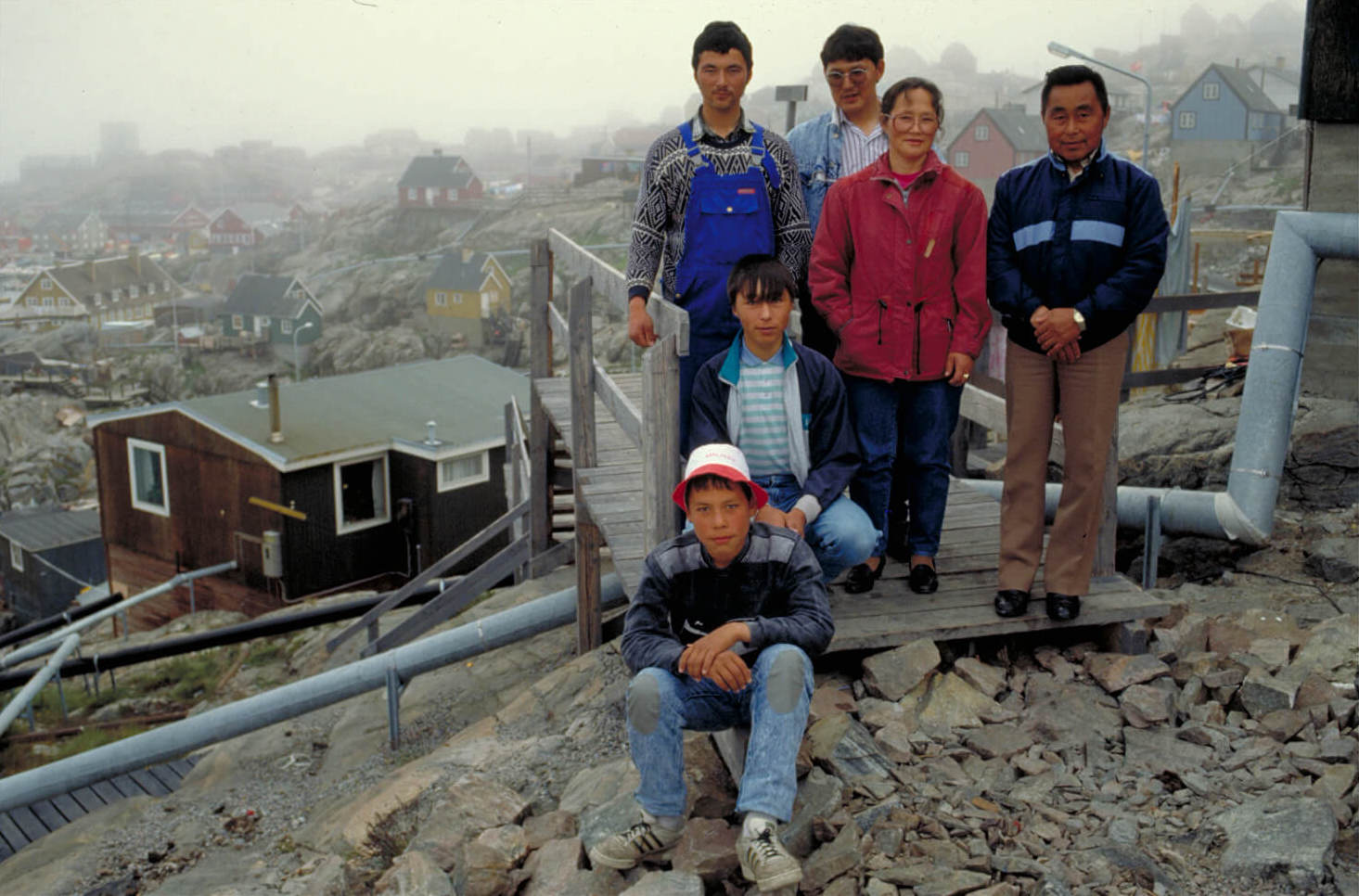
La famille Jensen
Kristian Jensen, 47 ans
Regine Jensen, 44 ans
Lars, 26 ans
Jens Ole, 23 ans
Anne Dorthe, 19
Edward, 17
Annak, 14
Intalik, 12
Uummannaq
24 juillet, 1989
The coucou clock rings seven times
7h00 Le coucou retentit dans le salon. Le réveil sonne dans la chambre. Régine s’extrait du lit étroit qu’elle partage avec son mari et enfile ses vêtement de la veille. En passant dans le salon, elle allume la musique avant de se servir un café au thermos.
Il y a toujours du café chaud à la maison. au-dehors on ne voit rien: Tout est couvert de brouillard. Régine met en route la machine à laver le linge, vide les restes du repas de la veille pour l’in des 27 chiens attachés à l’extérieur, et se rend à la maison de retraite de Uummannaq où elle fait la cuisine pour les seize vieillards qui y attendent de mourir.
Servir sept villages
Personne n’a entendu Anne Dorthe partir ce matin. Elle ne sera pas de retour avant quelques jours, elle est cuisinière elle aussi mais sur l’un des deux ferries qui desservent les sept villages du district de Uummannaq. Désormais ils servent surtout à l’approvisionnement en marchandises car la plupart des habitants ont leur propre bateau. Anne Dorthe essaye de travailler le plus possible l’été car en hiver, l’approvisionnement des villages se fait à l’aide de traineaux tirés par les chiens, ou de scooters des neiges. Le territoire, le long de la côte n’est pas recouvert de neiges éternelles. C’est là que vivent les habitants du Groenland.
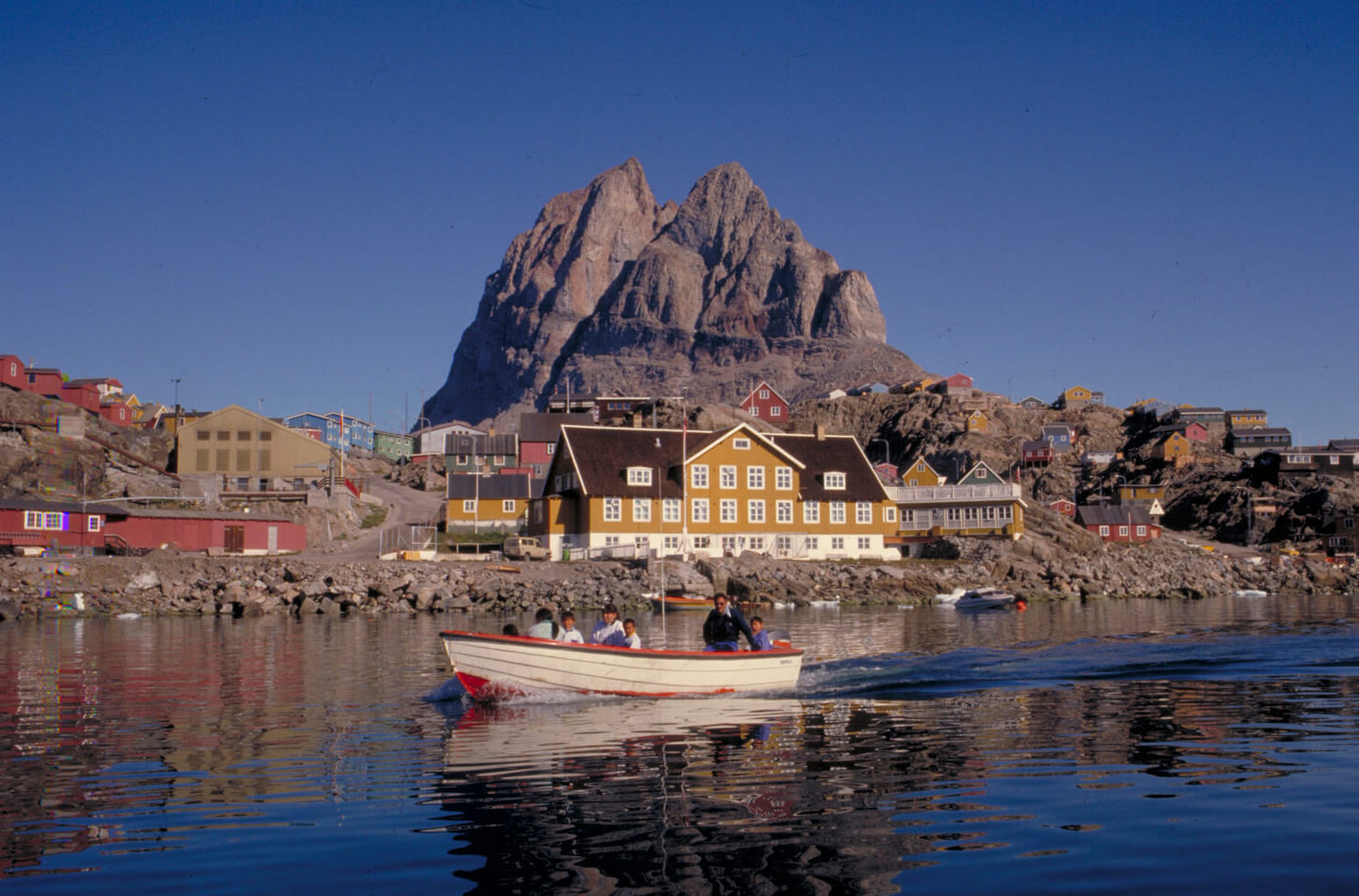
His head is as foggy as the Uummannaq fjord
7:30 Another radio starts playing down the hall and another loud alarm clock rings and rings without stopping and no one is turning it off. Finally Kristian cannot stand it anymore, he gets out of bed and enters impatiently his son’s Edward’s room. He stops the alarm and tells his son to get up. It will take four visit before Edward is up, sipping his coffee, like his mother, in front of the kitchen window. His eyes are red, his head is as foggy as the Uummannaq fjord. However it is better then yesterday. A day he started under the kitchen table, exactly where he was left drunk on Sunday night.
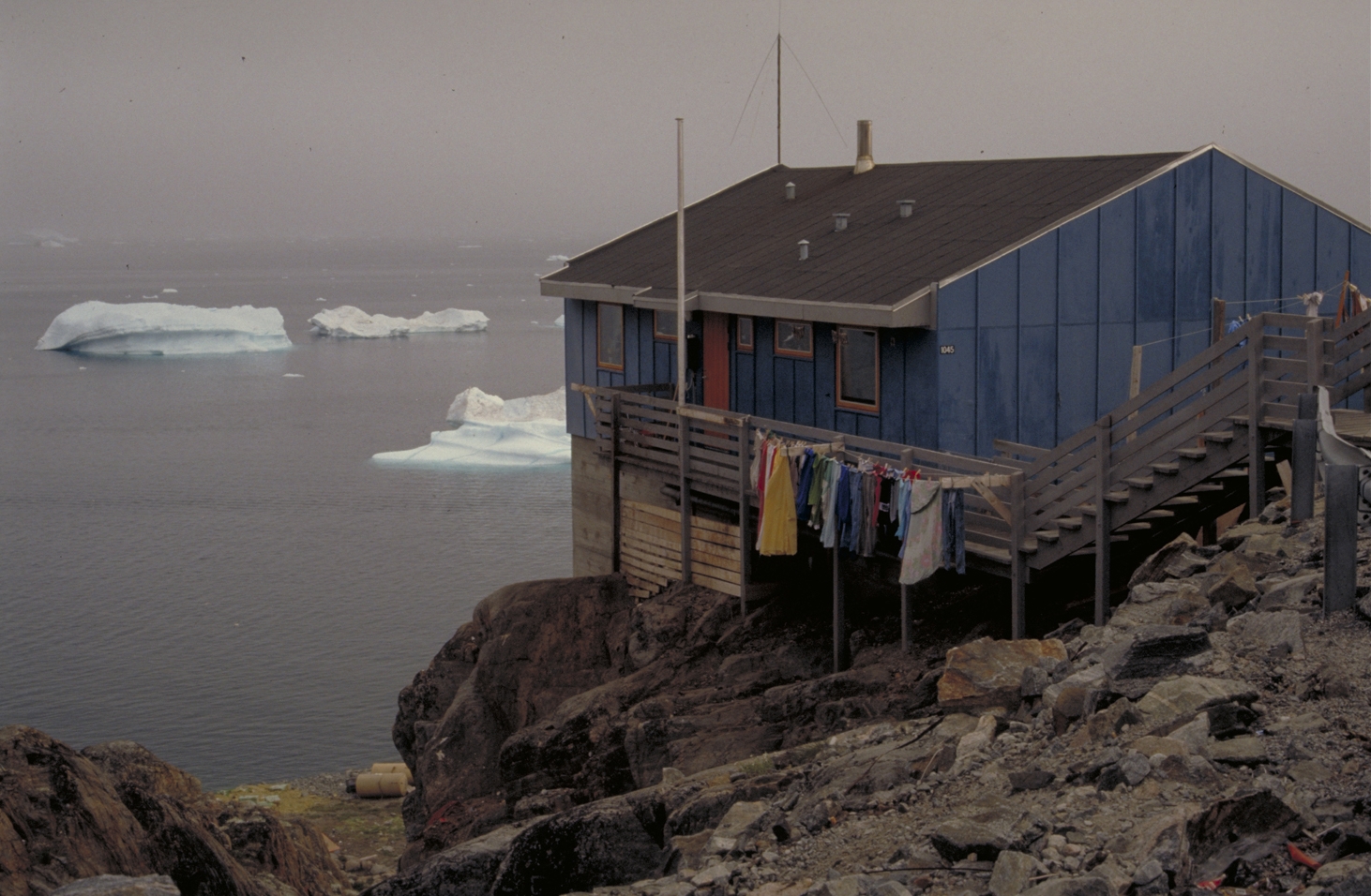
The intricate series of wooden stairs that unite neighborhoods
Now Sunday, that was a real beautiful day. The temperature had gone up.The sky was clear blue, the air was pure, the mountains of NOgssuaQ peninsula could al I be seen and the Iceberg shined whiIe drifting down the fjords to go and melt into the warmer water brought north the goIf stream.
Ummannak stood proud on its rocky cliff dominating it all. It has been God’s day and confirmation in the small stone church. For those that were not in tradition costumes, it was an ideal day to walk around and show the smartest fashion coming from Europe through Denmark. Boats have brought people from all the district viIIages. Everyone had been invited for tea and cakes, dinner parties and a night of drinking
Edward goes down the intricate series of wooden stairs that unite the different neighborhoods to one another. Following the port he passes the cemetery, the hospital and the newly bui It hotel before reaching the factory where he works. Edward is late and yesterday he did not shown at all. He was not the only one, most people did not and no employer expected them to. They know about the tomorrows of festivities. Some employers say all Sundays are a good enough reason to drink untiI unconsciousness and all Mondays are tomorrows of festivities. They compIain about aIcohoIism and the fact that they cannot count on the workers to show up at the time they should. But working at regular hours and days and having pleasure at very determined moment is not an idea that 600 years of Danish influence has succeeded to establish in the Inuit’s culture.
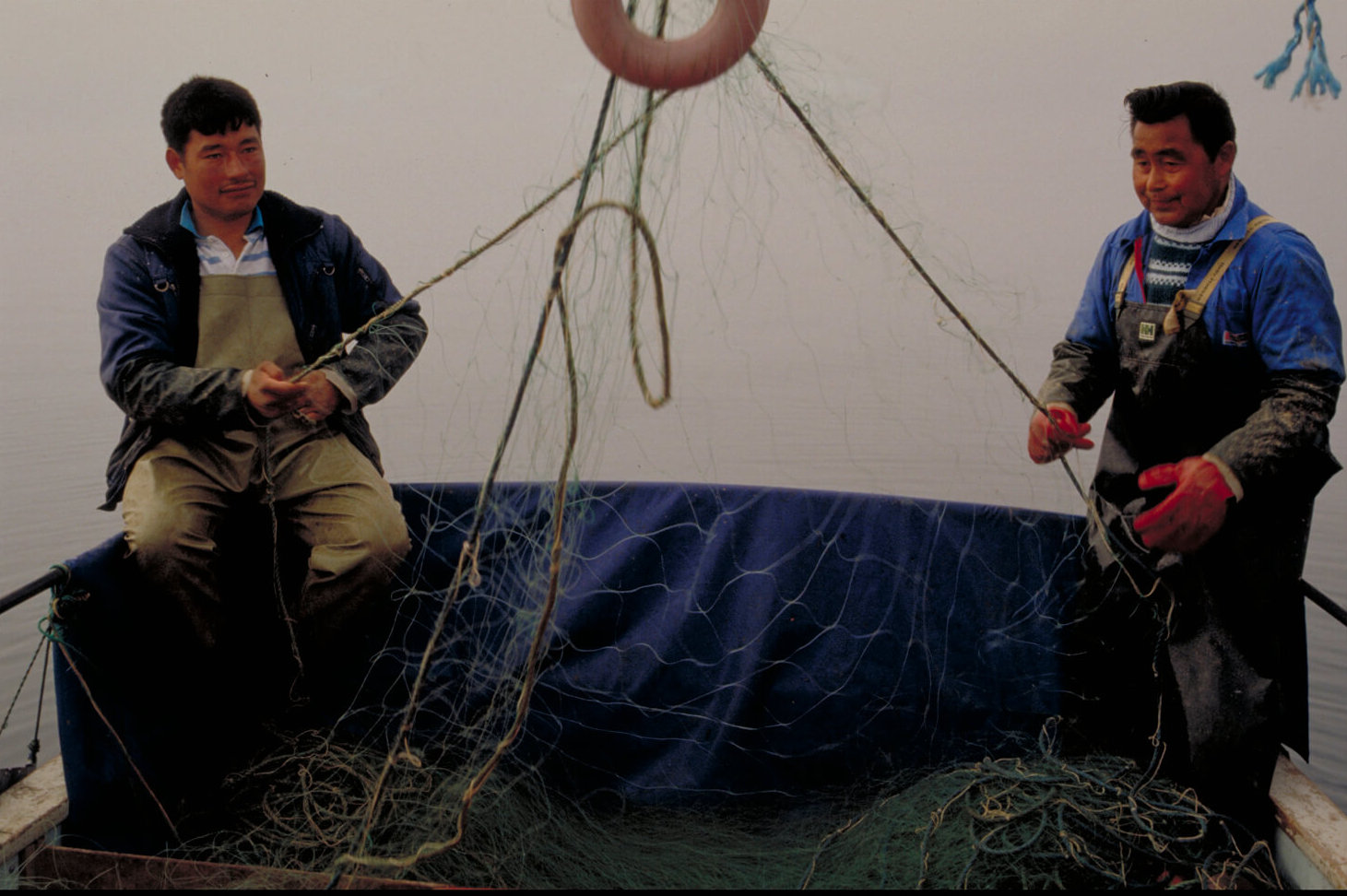
Independence
In fact time, as an invention brought here, is word not yet translated in the greenlandic Inuit language.* This is the time which makes it possible for the fish factory to work 20 hours a day in summer processing and selling 20 thousand tons of fish so that, million of thousands of kroners can be invested into the community so that one day, independence replaces Danish government subsizing. This time they say is bringing the Inuit away from poverty and ‘ahead from backwardness’ they had Iived in.
Physically part of the North-American continent, Greenlanders have their traditional attachment with the Canadian Inuit. Politics and economics are dealt with in Europe And on days Iike today Greenlanders question this European relationship with time.
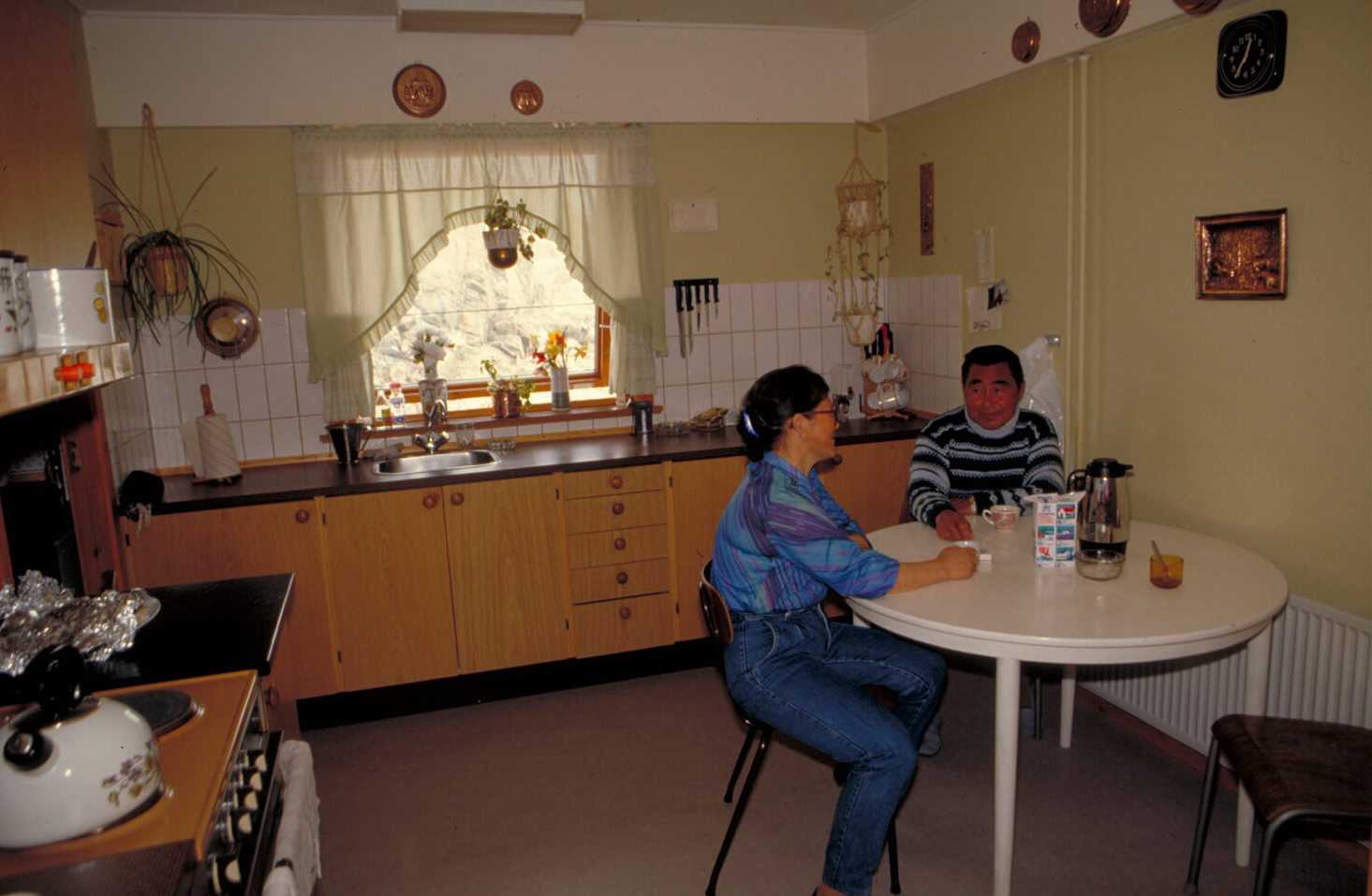
The word time sounds Iike the complaint of the seal
For Kristian sitting at the kitchen table, drinking a coffee silently, the word time sounds Iike the complaint of the seal that echoes through the mountain size icebergs. It sounds Iike the lonely hauling of the hundreds of dogs parked on the rocks for the summer season, who are visited with food only once a week.
For him there is the sun that shines and six months of daylight. Then darkness and two entire months where the sun does not even show up the horizon, leaving them alone forgotten in darkness. The Inuit time is the call that comes from the sea and the skies.
No one is to tell Kristian when to do what is has to do but the sky. And right now, through its blanket of fog, the sky is telling him to enjoy that coffee, there is nothing else he can do. -It is not usual to have so much fog during the summer months. Just a bad season: he says quietly.
A model of an Inuit
A sealer and fisherman, Kristian is proud of his independence and tradition. He is however determine to give himself good conditions of life and he succeeds. Everyone in the region knows that Kristian is a hard working man and is talked about as a model of an Inuit who, adapted to the modern needs of surviving. Traditional seal hunting, however, is what Kristian Iikes to do most and he cannot resist it when the sun shines, that the sea is Iike a mirror and hunting is at its best. Like a cry from the heart, these days attract not only him but pulling even the workers out from the factories. This is what they have learned to do as a chi Id to survive.
In winter Kristian hunts with his sons and their dogs and with his motor boat in summer. StiII today, it is seal meat that constitute the famiIy’s main food and it is from the seal that Regine makes Kritian’s winter clothing. -No European clothes can replace their warmth.” they both say.
11 :00 Kristian stands at the living-room window. He has to stretch his neck over the plants that decorate the window shelfs to see out. Since yesterday, the iceberg that has found is base in the entry of Uummannaq port has melted a little more, some have drifted away towards the warm waters of the gulf stream, and others have broken in half and it is giving them other shapes. All architectural designs created by man have been invented here before by nature.
The fog is lifting, the sky is speaking. Kristian understands the nature he sees and calls his married son Lars. Of all his sons, only Lars has opted for his father’s Iife. Like him, he says he Iike the freedom and independence of fishing and hunting.
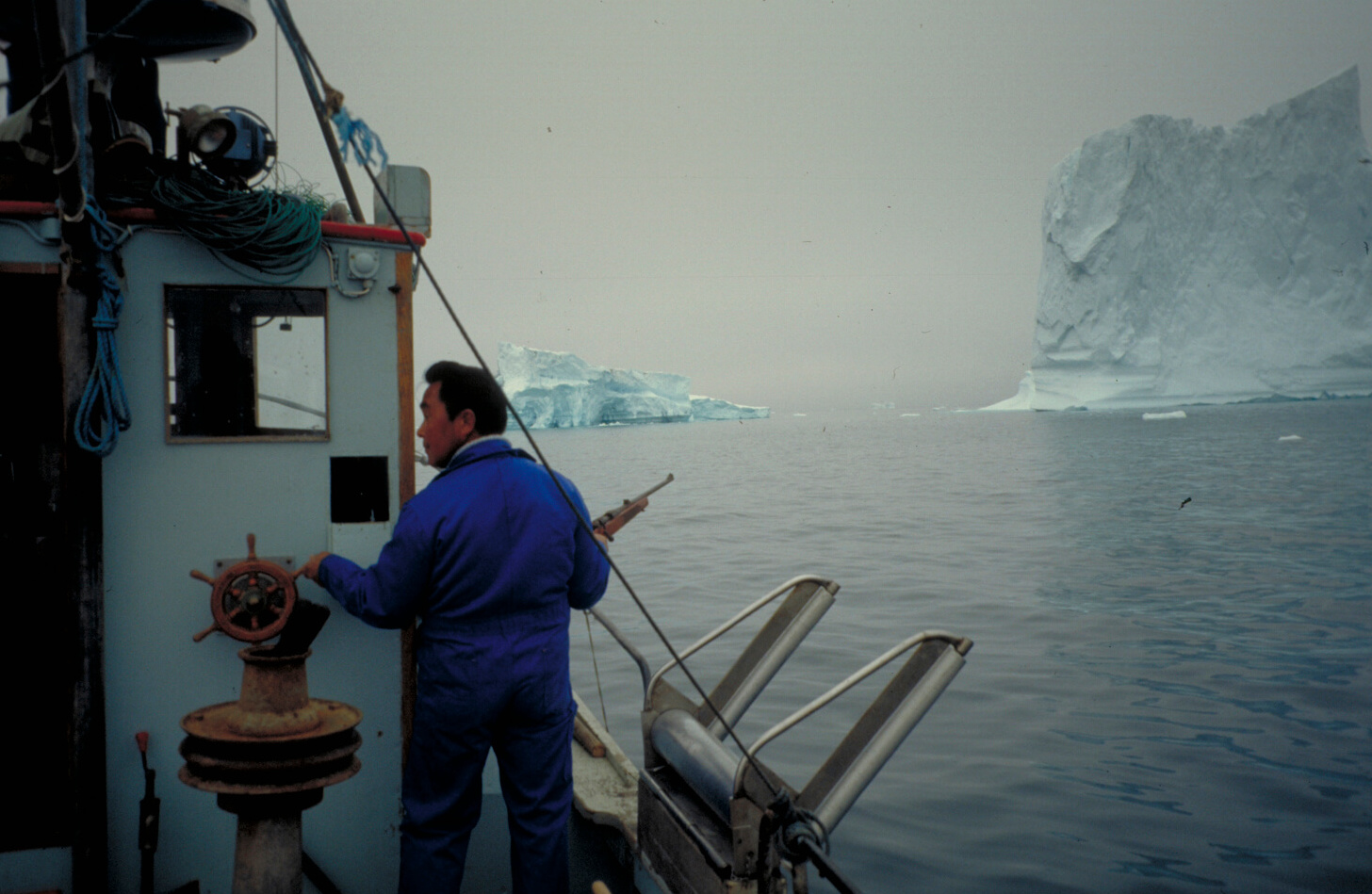
Fishing is symbol of the past, a symbol of hard work.
Kristian’s other son Jens Ole, like Edward, has opted for plumbing and is now working on heating systems in Illorsuit, 86 km away. Fisheries, the most important industry for the country’s income, is in dire need of managerial talent. It is, however, difficult to get young people to study fisheries today. Fishing is symbol of the past, a symbol of hard work. A free education in a trade which will bring easy money is now more the young people’s dream. But in a country where the opportunities for career are Iimited, few meet their dream high is the rate of disiIlusioned young people who to alcohol or suicide.
Each in their respective house, both in front of their windows looking at the water, the sky and fog, Kristian and his son Lars pIan their day. “Lets meet at the boat at twelve.” Kristian agrees with Lars and hangs up the phone to ring Karl a man who fishes with them and let him know the meeting time.
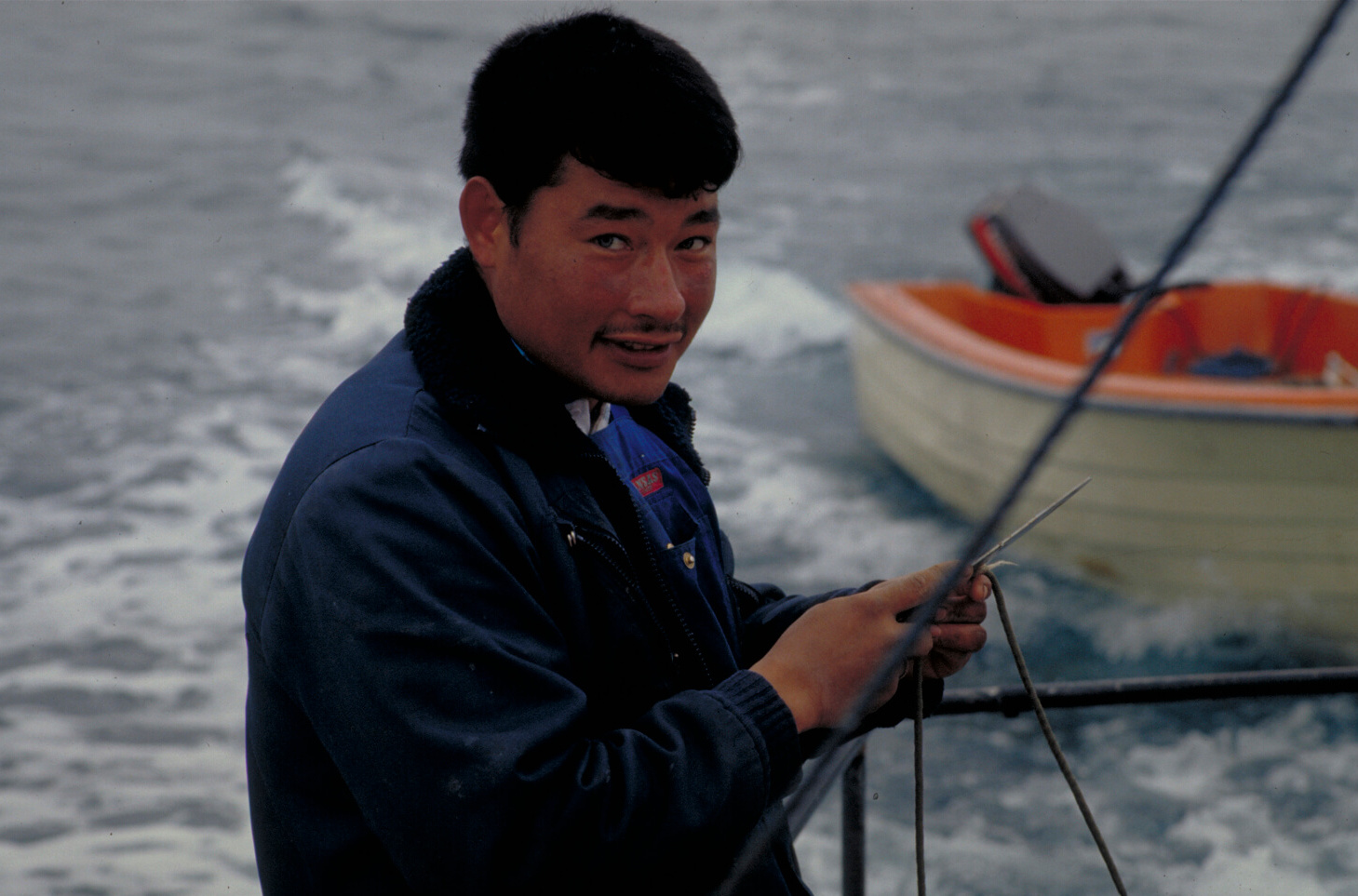
Happy of home rule
Kristian does not speak politics but reflects all those who Iike him are happy of home rule with an inner dream of full independence. Part of the North-American continent, Greenland has its traditional attachment with the Canadian Inuit when its political and economical attachment is with Europe.
1 :00 The mail man walks in the always-unlocked house, puts the mail on the kitchen table, says hello and goes out again. There was no one to answer him. Annak is stiII in bed. Down under the house ,where seal skins fishing and hunting gears are kept, Krlstian is getting a roap down he needs for the boat. He then heads for the port.
12:00 The factory ….. sounds, the stone church bells rings and the Samoyeds hawl in chorus, like if, once more, time hurted and was something to cry about. Edward comes home for lunch. Music will certainly wake Annak up. Edward starts plays the electronic piano.
Annak, stiII completing her nine years compulsory education is on holiday. Lazily, she lifts herself off the floor where she has slept and follows her brother in the kitchen where he is preparing egg sandwiches.
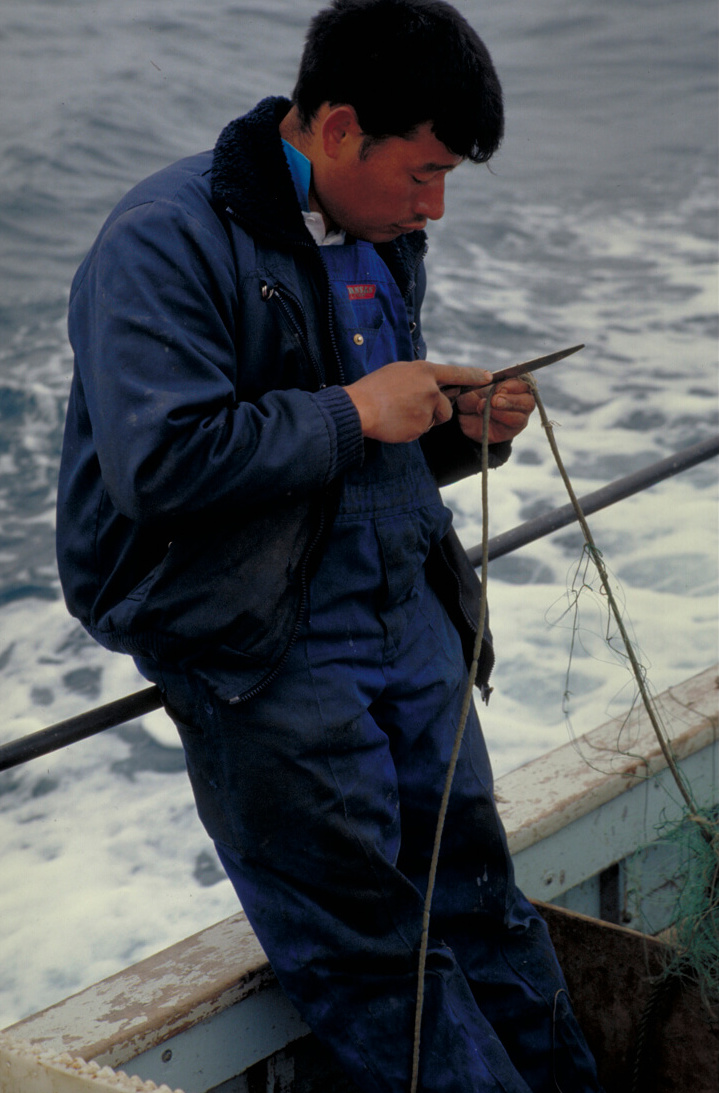
All is ready for departure
Kristian arrives on the rocks at water hedge. Behind him, his young nephew Intalik is following him Iike a shadow. With the small speed boat Lars comes and gets them. The 5 tons anchored boat is a Iittle further away. Lars and Karl have prepared the boat. All is ready for departure.
Uummannaq is known as a sealing district but the sideline of fishing is becoming more and more important. Halibut and Cod once only used for dog food or to feed the very poor who could not hunt, has now become the most important income earning.
Kristian knows the number of tons of fish he has to catch to afford his house and family needs and he seriously goes and gets it. In the village people say there are not very many fishing man as serious has Kristian. Too many like drinking it is said.
The crew accompanied by a young nephew of twelve leave the port heading across the fjord towards Saattut 26 km away. Kristian knows we II the waters there. Saattut is where he was born and lived in one of traditional stone and pit house. Beside being a seal hunter he became a self-made carpenter. After he married Regina he Iived with her parents then rented an old house.
It is Regina that pushed Kristian to moved to Uummannak and buiIt there the famiIy’s first modern home. In the 1960’s electricity became first available there and Iittle after piped water was available in summer. Then in the 70’s they finally had full piped water all year round and did not have to walk to the lake and break the ice for water in winter. For all this Regina preferred to Iived in Uummannak and also to be around 1,300 people where she found more friends then with the 200 population of Staattut.
Kristian preferred his traditional and he shortly moved back to Saattut in the old house and went hunting and fishing. In 1978 he finally bought a boat and became a fishermen. One year later, Greenland was getting homerule from Denmark and a fish factory was built in Uummannaq. Income other then sea I had to be generated and it was not ease to make the changes from hunter to fishermen. As fishing was mostly done to assure dog food, the first real fishermen were laugh at until it became evident that the income was better then hunting and that with money things could be acquired. Kristian moved back to Uummannak.
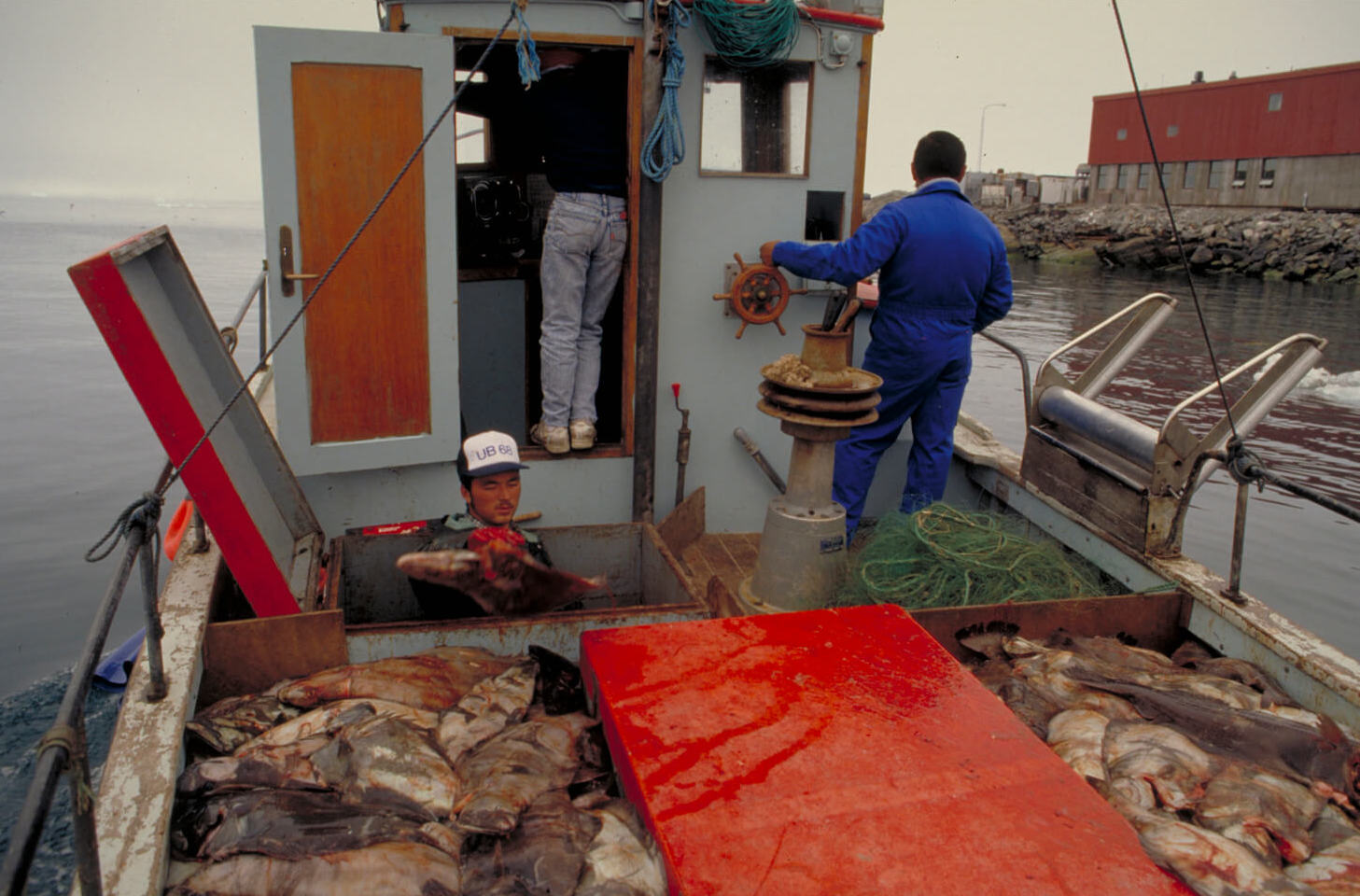
There is no seal that these dealers won’t see.
Later the international campaign against the kiIIing of baby seals that was practiced in Canada affected seal hunter’s life allover the Arctic. The demand diminished so much that the government has now to subsidise the hunters catch paying them 300 Kroner for each skin and selling it back at lost for 100 Kroner.
All the way to the fishing spot all eyes are hooked to the sea. There is no seal that will show up that these sealers won’t see. But there is little chance for them to come near by today now that Intalik has the gun in his hands and is practicing to shoot on the wild ducks. Kristian teaches Intalik who drinks his uncles words. Surely this will be a future sealer.
The boat comes to an alt, the ancre is thrown overboard and the men get ready. Pulling on their rubber overalls and start to pull on the 200 meter nets that had been left. Five time they wiII be stopped by sharks caught in the nets. Kristian pulls them out, tries to save as much of his nets in the process and throws the giant fish back at sea but not before taking out the heart. With this tangible proof, the government will give him a bonus of 100Kroner to repair the damage nets.
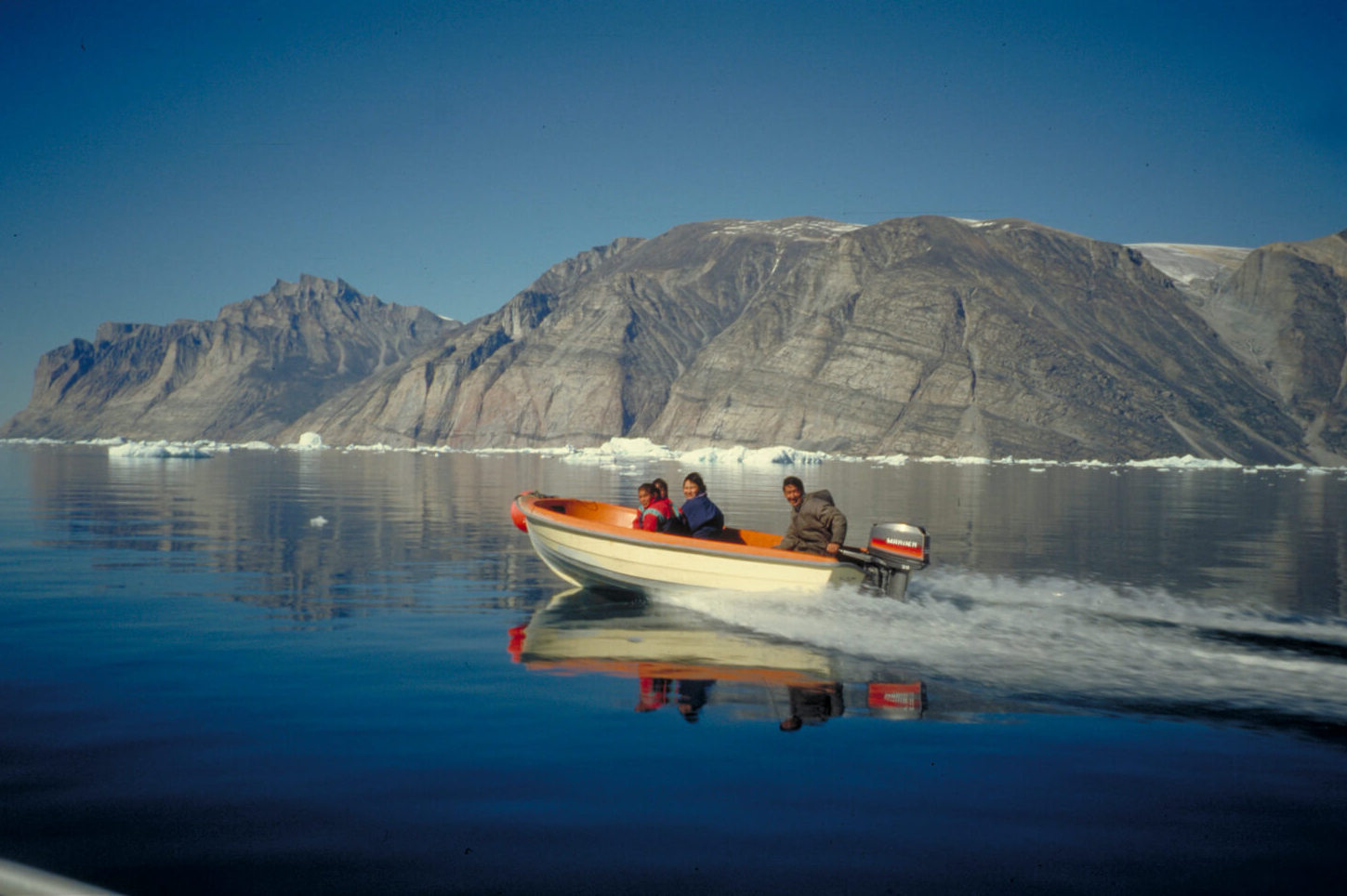
The history of her Iife is displayed in the 110 pictures
The sea has gone calm and Lars leaves with the speed boat for some hunting. He disappears behind an iceberg and comes back a few hours later to the pride and joy of everyone, with a seal. The fishing continues.
7:00 Annak has been out all day visiting the extended famiIy members and friends, Iiving her life freely. Edward does the same when not working. Regina just accepts them when they are there. The chiIdren now grown, she gives her time to her work and assures that she is there when Kristian and the crew need her. She warms herself some soup then sits in the Iiving room with a cigarette and a beer. She turns on the television but does not put on the sound. The six hours of Danish, American or Brazilian serials do not interest her. The video has not made its entry into the house yet. Regina puts on an audio tape of a Greelandic singer.
Around Regina there are more and more objects from modern Denmark. She takes what is being offered and with Kristian decide the part of their past they want to carry along with them in life.
Around her, her knick-knack full Iiving room, the history of her Iife is displayed in the 110 pictures that hang on the walls or lay on (buffet) furniture: One can discover her Iife before marriage, the burial of grandmother, marriage, the birth of the first grand-chiId, the confirmation of every chiId. The story is stopped by a series of football trophies and those of the winers of the dog sleigh race where the Jensen sons, as in hunting, assure every year their reputation of good sportsmen. The whales’s horn is there to prove it too.
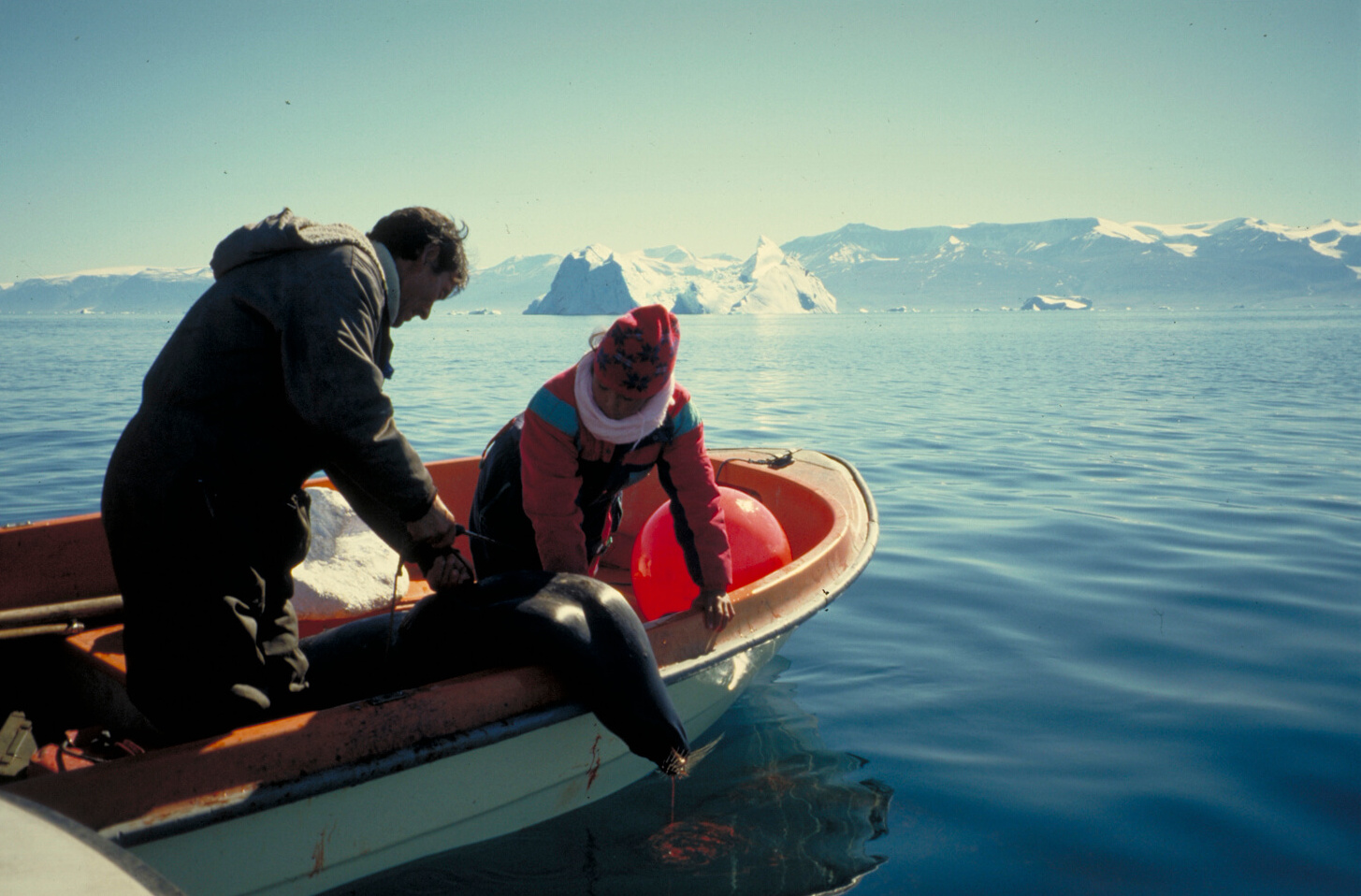
He disappears behind an iceberg
The sea has gone calm and Lars leaves with the speed boat for some hunting. He disappears behind an iceberg and comes back a few hours later to the pride and joy of everyone, with a seal. The fishing continues.
7:00 Annak has been out all day visiting the extended famiIy members and friends, Iiving her life freely. Edward does the same when not working. Regina just accepts them when they are there. The chiIdren now grown, she gives her time to her work and assures that she is there when Kristian and the crew need her. She warms herself some soup then sits in the Iiving room with a cigarette and a beer. She turns on the television but does not put on the sound. The six hours of Danish, American or Brazilian serials do not interest her. The video has not made its entry into the house yet. Regina puts on an audio tape of a Greelandic singer.
Around Regina there are more and more objects from modern Denmark. She takes what is being offered and with Kristian decide the part of their past they want to carry along with them in life.
Around her, her knick-knack full Iiving room, the history of her Iife is displayed in the 110 pictures that hang on the walls or lay on (buffet) furniture: One can discover her Iife before marriage, the burial of grandmother, marriage, the birth of the first grand-chiId, the confirmation of every chiId. The story is stopped by a series of football trophies and those of the winers of the dog sleigh race where the Jensen sons, as in hunting, assure every year their reputation of good sportsmen. The whales’s horn is there to prove it too.
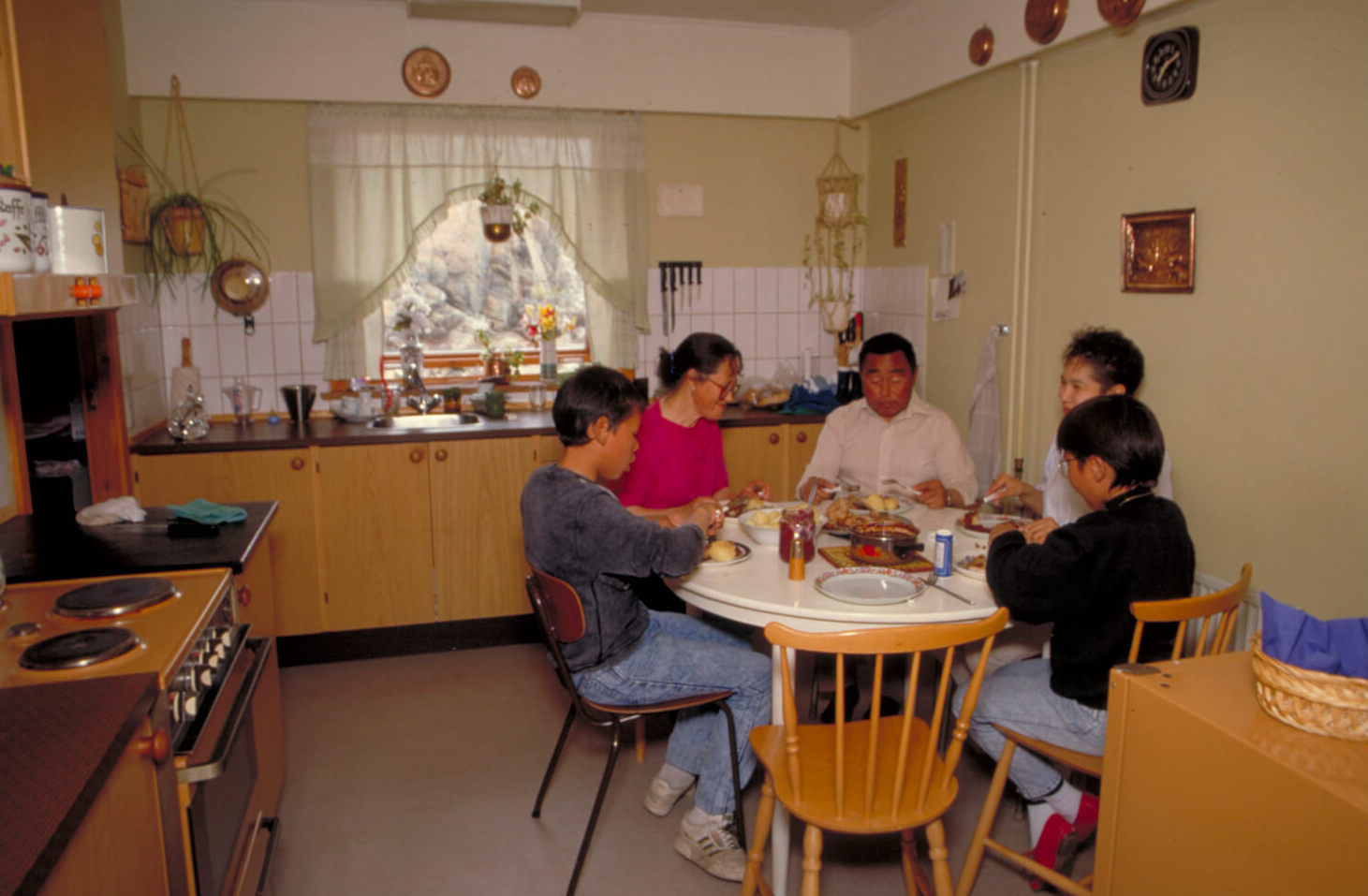
Chez-soi au Groenland
C’est une aventure, c’est un éveil et c’est humain

